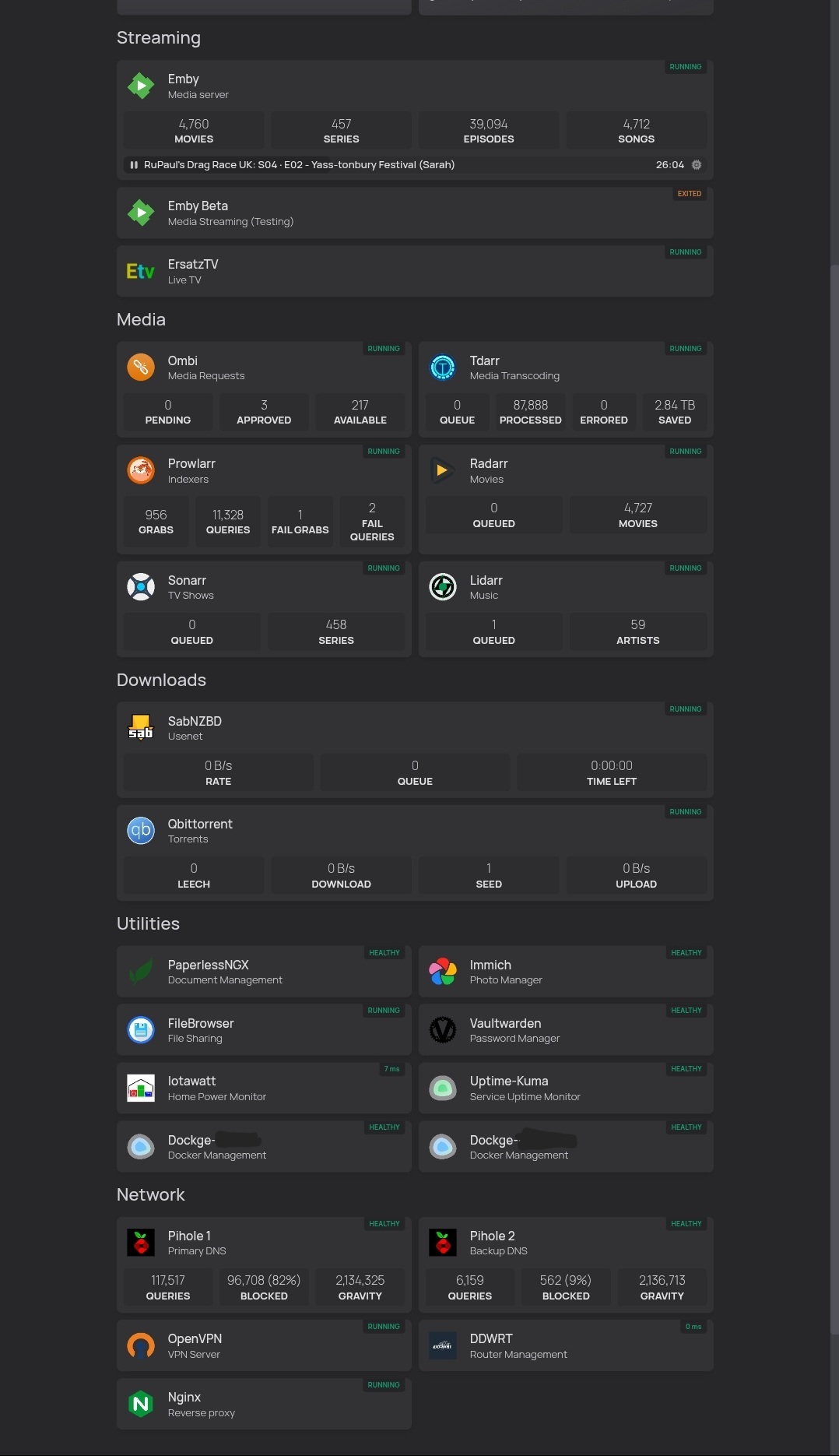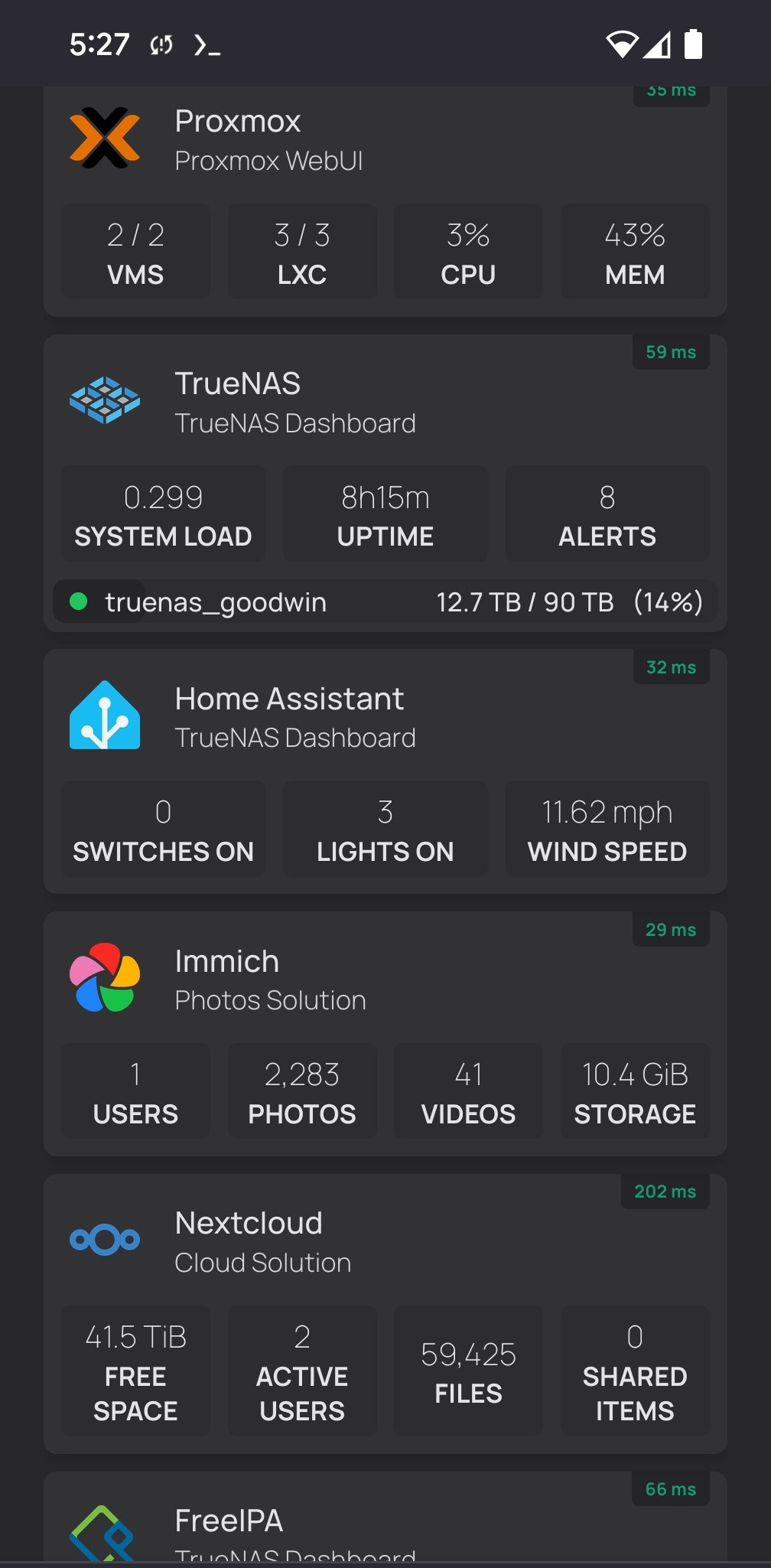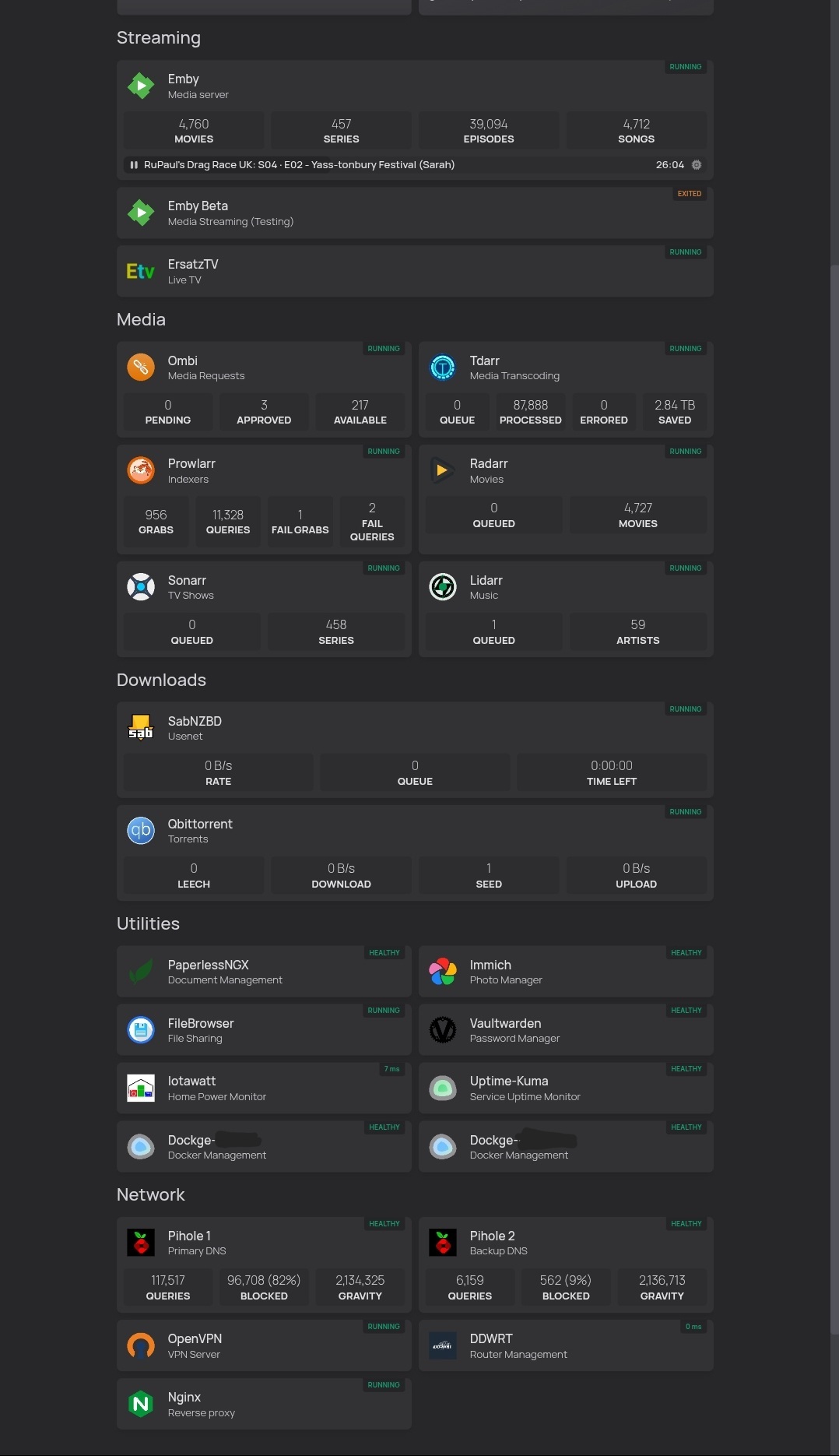Over the years I accumulated very many services which I host myself and each of them has it’s own URL:
- 6 websites, mine and my sisters
- 3 instances of home assistant
- Uptime Kuma
- Synology with photos on it
- Matrix server
- Firefox sync
- TinyTinyRSS
- Mastodon
- PeerTube
- PieFed
- Immich
- Open WebUI (for local large language models)
- UniFi (CCTV)
- Baïkal (Cal- and CardDav)
I’m probably forgetting some of them now and I’m planning to host more in the future.
The problem is how to remember all of those URLs or domains. I have a system how I call them, but my extended family can’t really remember them.
I think it’s time for a landing page. Do you guys have any suggestions?
Heimdall seems to be the popular choice: https://github.com/linuxserver/Heimdall
Homarr is more or less turnkey, as long as you use Docker to deploy your services.
I wrote my own, using plain HTML/CSS. Actually the final .html file gets templated by ansible depending on what’s installed on the server, but you can easily pick just the parts you need from the j2 template
I think you pretty much just now wrote a landing page, you just need to turn those into links and host that page somewhere.
Sure, you could create a database or JSON file with attributes of each thing and use React or Node.js to generate the UI, but that doesn’t seem necessary for a need on this scale - when things change just edit the landing page. I’ve been keeping links to my soft copies of D&D books and stuff with a simple HTML page for years, and I’m a web dev. No need to do work the requirements don’t demand.
I just made a landing page in HASS, if you’re already running three instances could you make a page in one?
Hm, so you just used some cards to make links and icons somehow for that? But then I would need to replicate it on at least my dads and our instance.
Yep, here is the yaml but redacted
- type: entities title: Communication entities: - type: weblink name: Webmail url: https://postale.io/ icon: mdi:email - type: weblink name: Mattermost url: https://mm.stuff.com/ icon: mdi:chat - type: weblink name: Mumble Server url: https://mumble.stuff.com/ icon: mdi:radio-handheld
GetHomepage.dev
I use wiki.js in the linuxserver.io flavor. I have 3 URLs for every service I run: public, LAN, and tailscale url. My “homepage” is a big markdown table with links to all the services. It’s not pretty by any means, but it’s very functional
Do you guys have any suggestions?
Because I don’t like software getting in my way I just cobbled together some HTML and CSS and call it a day.
Similar, but more fancy, I have a bash script that runs every 15 minutes and ingests a config file. The config file has a super simple CSV format of every service I have. It checks that all the services are operational and generates an HTML file from it. If any services are down the HTML will show its down, otherwise its just a helpful link.
I run my website as static site from within a Docker container, I wonder how I would get the information about the other containers into that site.
Do you directly serve that site from the host or do you run the script and write something in a volume the site has read access to or bind a file?
I host it on the host that runs the script and proxy it. I have one mission critial pi that is my uptime bot, pi hole and backup VPN if my elaborate server falls on its face. But you could easily use docker volumes too, and have the script push to that folder.
I use flame. It’s super simple and minimalistic. Best part is nothing random moves like homer/ar or whichever.
Gives you a nice dashboard that you can configure however you like. It includes integration with a ton of existing services, as well as docker.
My setup:
Clicking on each service will open it’s respective url.

The ‘healthy’ indicator at the top right of each service is it’s container health. Clicking on that will expand to show cpu, ram and network usage. Some of these services/docker hosts are on separate machines; it all integrates together nicely.

There are a bunch of other static site generators as well. They’re mostly targeted at blogs and whatnot, but maybe that’s a good thing if you want to leave some instructions/documentation about each one.
This is what I use. I tried other ones, but this one is simple to set up and edit. It’s very clean and has a ton of widgets for services. I would like it to have a login option, but that isn’t a deal breaker.

Yeah; the lack of authentication options is a bit of a bummer if you’re going to expose/share this page. There is always basic_auth in nginx or whatever proxy you’re using if you really want.
I love homepage for this purpose. Gorgeous, good UX, easy to configure, and lots of widgets/integrations.
Homepage is great, especially if the services are deployed on docker or Kubernetes. You can just add some metadata to each service and Homepage will automatically pick them up. No need to remember to update it directly for a new service.
Bookmarks are a thing
I have everything in bookmarks but the discoverability of them in my browser is not very good for the rest of the extended family.
Honestly, a landing page for me is just another thing I need to mess with. Bookmarks and using keywords to load them is so easy. Once they’re in a bookmark, I’m just using keywords to get back to wherever they are. Super easy.
How do you share your managed bookmarks with your wife, father, children, siblings?
I wouldn’t. People can bookmark their own things. Honestly, with browser histories being so readily accessible to recall sites anymore, I feel like isn’t a problem that people struggle with. Probably why you’re not getting much traction here for your specific angle.
Actually I feel there are many very good suggostions here already like:
- Homepage
- Heimdall
- Static page with HTML links and CSS
- homarr
- Flame
- organizr
- Jump
- glance
It’s more than I expected already.
That’s not helpful to their question
I used to feel much the same way. I had a pile of bookmarks and a couple permanent browser tab groups.
That changed when I tried out Homepage
On top of just putting all the links in one place; it was really nice to combine a bunch of information from each service to view in one place.
Now I can look at a single page and see with a quick glance; what+how many items are queued in Radarr/Sonarr/Lidarr, what’s queued or errored in Tdarr, item count/time/speed in SabNZBD/Qbit, who’s streaming what in Emby, and even CPU/RAM usage across multiple systems. (not pictured)
I’d recommend exploring it, I didn’t think something like this was worth it until I actually tried it myself.

If you want some ideas, there are plenty of examples here:
https://old.reddit.com/r/selfhosted/search?sort=new&restrict_sr=on&q=flair%3APersonal%2BDashboard
I use glance.
Static, hand coded html. You can be as pretty as you want to be. A good learning exercise and since it is all static it will be fast and won’t have more security issues.
Or if you want to learn a JS framework, you can also do it that way.









